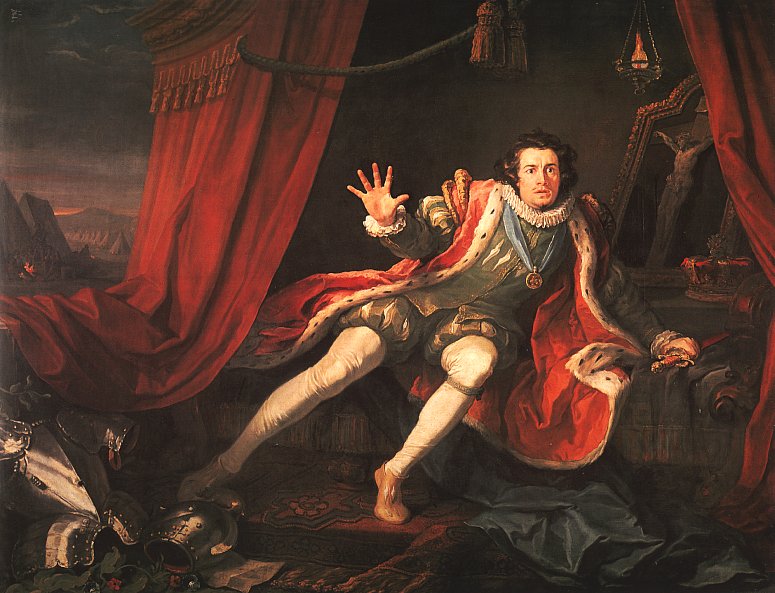 I’ve been trying to figure out a work that gets at the death of Qaddafi, the Libyan dictator who was killed ten days ago. A reader suggested Shelley’s “Ozymandias,” a poem I posted when Hosni Mubarak was overthrown. But a New York Times article on the death of dictators reminded me that the deaths of Macbeth and Richard III are even more apropos.
I’ve been trying to figure out a work that gets at the death of Qaddafi, the Libyan dictator who was killed ten days ago. A reader suggested Shelley’s “Ozymandias,” a poem I posted when Hosni Mubarak was overthrown. But a New York Times article on the death of dictators reminded me that the deaths of Macbeth and Richard III are even more apropos.
Simon Montefiore believes that dictators reap the whirlwinds that they sow and writes that Qaddafi deserved his grisly execution. Writing about the way that tyrants think they can control everything, even their deaths, Montefiore invokes some of Shakespeare’s bad guys:
If a tyrant cannot die in his own bed, the best he can do is try to stage manage his downfall, because such characters find it unthinkable to exist without ruling. Colonel Qaddafi, like many others, was so narcissistic that he first denied the fact of the revolution before embracing his own reckless, heroic role, the drama of the last stand: “I have set my life upon a cast,” says Shakespeare’s Richard III, “and I will stand the hazard of the die.” Colonel Qaddafi could have saved his family and thousands of lives by retiring to a villa and later facing the International Criminal Court. Yet the narcissist envisages his downfall only as a mise-en-scène featuring his followers, family and country, consumed in his bonfire of egomaniacal nihilism. Colonel Qaddafi must have planned to die in battle like Richard III and Macbeth, or to kill himself. Yet this monstrous poseur totally bungled his own death.
One wonders if, in his final hours, Qaddafi voiced some version of Richard’s cry, “A horse, a horse, my kingdom for a horse.” Or was he as defiant and delusional as Macbeth?
I will not yield,
To kiss the ground before young Malcolm’s feet,
And to be baited with the rabble’s curse.
Montefiore’s article brings to mind another tyrant in the last moments of his power. Even after Oedipus has blinded himself and is about to be exiled, the headstrong king still believes he can set conditions. Creon finally informs him,
Crave not mastery in all,
For the mastery that raised thee was thy bane and wrought thy fall.
I have some qualms about elevating Qaddafi to the stature of a Shakespearean or Sophoclean hero. It seems to give him a magnificence that he does not deserve. But those authors understand narcissism well, and dictators like Qaddafi are masters at inflating a sense of self.
Now, of course, we all hope that Libya can build up those social institutions that Qaddafi trashed and establish a lasting peace. Violent overthrows do not always turn out well. Let us pray for some version of the ending of Richard III, with Richmond/Henry VII functioning as the Libyan people:
Richmond: God and your arms be praised, victorious friends,
The day is ours, the bloody dog is dead.
Derby: Courageous Richmond, well hast thou acquit thee.
Lo, here, this long-usurped royalty
From the dead temples of this bloody wretch
Have I pluck’d off, to grace thy brows withal:
Wear it, enjoy it, and make much of it.
Amen, people of Libya: Wear it, enjoy it, make much of it.

2 Trackbacks
[…] Better Living through Beowulf How great literature can change your life Skip to content BlogBook discussion groupsAbout « Qaddafi Died Like Macbeth, Richard III […]
[…] The Deaths of Qaddafi, Macbeth, Richard III As Shakespeare understood with Macbeth and Richard III, narcissistic dictators like Qaddafi are so obsessed with control that they think they can stage manage their own deaths. Source: http://www.betterlivingthroughbeowulf.com […]